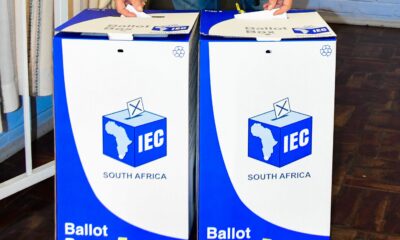
Featured Item

ANC’s weak diplomacy made Rasool’s expulsion ‘inevitable’
South Africa could have avoided having its ambassador disgraced and thrown out of the United States (US) said Sara Gon, the director of the Free Speech Union of South Africa at last week’s Taste of Limmud discussion with political analyst Wayne Sussman.
“It could have been avoided if the African National Congress [ANC] hadn’t been the party with the power for the past 30 years,” she said. “One of the problems with the South African diplomatic corps is that it’s really a place of assigning those people who have retired or disgraced themselves in a number of ways. Our diplomatic corps has been really unprofessional.”
Sussman and Gon were discussing whether the US needed South Africa or the other way around on Wednesday, 2 April.
Gon said the ANC was headstrong in its policies, often to its detriment. The ANC lacked strategy when it came to improving relations with the world power, and needed to change its tactics if it wished to make strides with the Trump administration.
Though Gon believes the ambassador’s expulsion could have been avoided overall, she doesn’t believe the ANC could actually have prevented Ebrahim Rasool from being expelled because of its poor analytical foresight in choosing a mediocre ambassador with a problematic profile, not least of all in his support for Hamas. She believes the ANC has never appointed an ambassador with the necessary gravitas for the world’s biggest power.
Gon went on to say that the ANC thought that it, or Rasool, would be working with the Biden administration and didn’t take into account that President Donald Trump might actually win the election. Rasool was a “red flag to the [Trump] administration”, she said.
Gon and others at the event suggested that perhaps Rasool sabotaged himself to get out of the US as he couldn’t get near the US administration to participate in any forms of diplomacy. She said the South African government’s diplomacy revolved too much around “taking without offering something in return”.
Though there’s speculation about who the next ambassador will be, Gon said whoever it was needed to be diplomatic and have some understanding of how the US functions. She said it would be problematic if the ANC did find someone from within its ranks, but it also would be difficult for someone more suited to the task to defend the policies that the ANC is so tightly hanging onto.
Sussman agreed, saying, “I understand from diplomacy that a country wants to receive an ambassador who is likely to be taken seriously by the president of that country and the headquarters of the ruling party. What we are seeing with the negotiations over the Budget, is that President Cyril Ramaphosa and Fikile Mbalula aren’t going to take the Democratic Alliance, Patriotic Alliance, or Freedom Front that seriously.”
He suggested the next ambassador be someone on the National Executive Committee of the ANC who was pragmatic about foreign policy and respected. “The challenge is finding someone who ticks all three of those boxes,” Sussman said.
Sussman asked Gon about South Africa’s role in punting BRICS (the forum for co-operation among leading emerging economies) and its recent addition of tyrannical countries, particularly Iran, and whether it was another negative for the US.
South Africa appears to believe that its role in BRICS will give it some authority, both moral and in stature, as a competitor to the US’s hegemony, Gon said. The problem is that Russia’s economy is weak, and so too is Iran’s. Though Saudi Arabia is in BRICS now, the changing balance of power in the Middle East away from Iran and its proxies runs the risk of reducing BRICS’s stature as a real competitor to the US. China’s economy is also not as robust as it once was, Gon said.
Gon said every response South Africa made to the actions of the Trump administration was reactive. The ANC presented itself as occupying the moral high ground by supporting entities who took part in some or other form of “liberation struggle”, she said, and by holding onto dated socialist policies. The US isn’t concerned about India, which has relations with Russia and China as well as the US, but is diplomatically sophisticated enough to have relationships with both sides without alienating either.
If South Africa was an ally of the US, its position at the bottom of Africa could have some real strategic value to the US in its dealings with China, Gon said. However, because of its unrepentant support of all things Chinese, South Africa under the ANC just cannot be trusted.
The Limmud audience sought answers from Gon and Sussman about future relations between the US and South Africa while Trump is in power. One Limmudnik commented on the unpredictability of Trump, which she said would make any attempt at reconciliation with the Trump administration futile as he could chop and change his mind the next day.
“Why would any rational approach be accepted by Trump?” she asked. Gon responded by referring to Trump’s “enormous ego” as a tool that could be used to the government’s benefit. “You expect it to be more professional than that, but sometimes it’s not,” Gon said, alluding to the political chess match being played. “Look at the way the [Kier] Starmer government, a government on the complete opposite side of the ideological spectrum, has responded to him showing a sense of real political power. It’s about adjusting to the world you actually face,” Gon said.
She said it was time the ANC let go of policies from 60 years ago, and was proactive in adjusting its politics to the world of today.










